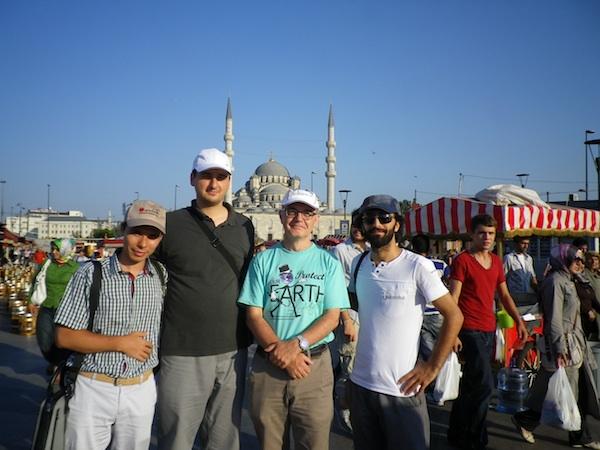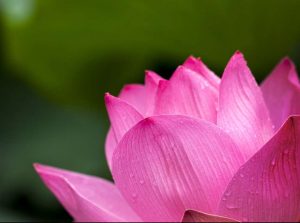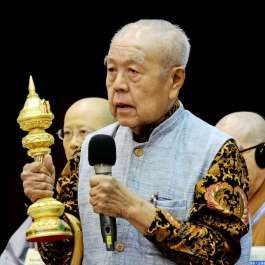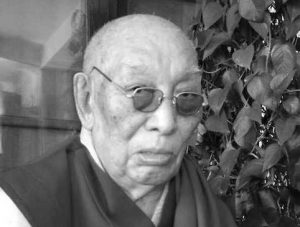Before leaving for Turkey I gave myself a personal promise to fulfill: to participate in the actual experience of fasting throughout my sojourn as it also coincided with Ramadan, which began two days prior to our departure. I made this decision for various reasons: to deepen my understanding of Islam from a practical/experiential point of view, rather than purely academic; to demonstrate my respect for my Muslim students and Islamic tradition (once my students knew of my decision they gave me their wholehearted support and guidance); and, to show respect while in a Muslim country during Ramadan. Joining the fast would also give me more of an insider perspective and appreciation of Islam and further my spiritual development.
Before the trip, I understood the meaning of Ramadan from an intellectual point of view. Ramadan is the holy month, which marks the period the Qur’an was revealed to the Prophet Muhammad. Muhammad is Allah’s last Messenger who, through the revelation of the Qur’an, embodies the final completion of Allah’s message to humankind beginning with the prophets mentioned in the Judaic and Christian traditions.
What I did not know beforehand was the extra rationale for fasting during Ramadan to mark this event. Fasting, the conscious denial of food and drink, allows us from choice to experience for a short time the pangs of hunger and thirst which countless others have neither chance nor choice to escape from. This daily fasting increases our awareness both of the suffering of others AND our appreciation, which we so easily tend to forget, of being able to eat and drink whenever we choose. The daily fast is a communal activity within the ummah without distinction of one’s economic, educational, social or political background. We are all one on an equal footing, unaware and uncaring of hierarchical positions, just the same as with daily prayers where everyone, rich and poor, line up together to worship Allah.
During Ramadan I did not eat or drink from sunrise to sunset. Actually, the fast began an hour or so before the sun rises. I would have Sahur, the meal that opens the fast, before 04:00 and end the fast with the Iftar meal depending on the time the sun set on that day. While in Turkey, depending on where I was, that could be 20:34 in Istanbul and 20:24 the further east we went (in Hong Kong, the sun set earlier, shortly before 19:00), giving me an average fasting day of 16 hours.
The first day was the most difficult for me. As a Buddhist I will fast on special days and when I was a Theravada monk I had no food after the mid-day meal (but I could drink!), so going for a long period without food is not difficult for me. The challenge came with the prohibition on drinking during the period of the daily fast, especially in the hot weather in Turkey. My throat quickly became parched, dry and difficult to swallow. I would frequently lick my lips in an endeavor to simulate the sensation of drinking. My fellow group mates would tease me, tempting me with delicious food and cool drinks but I persevered.
It is hard to describe the sensations that I felt at the first Iftar meal. I broke the fast by drinking water and eating dates. The shock of the cool water coursing down my throat enhanced my awareness and appreciation of the simple act of drinking water. Also, I became vividly aware of how others, less fortunate than I, suffer from loss of liquids and food. This was also a vivid act of instant awareness and mindfulness; experienced each night when I broke the fast.
I quickly fell into a daily routine of waking at 03:00 for Sahur, read some selections from the Qur’an and went back to sleep at 04:00. My Sahur was very simple: fruit, cookies, water and a yogurt drink. On a few occasions when I had Sahur with local Muslims, my fare was a bit richer. At the daily Iftar, I remembered not to gorge myself, or the reason for fasting would be negated. I ate just enough to feel comfortable, to keep my belly one third full.
We experienced Iftar in family settings and on a couple of occasions in larger communal surroundings such as having Iftar with staff and families of a school. I would just like to add here, that upon my return to Hong Kong, I went to Kowloon Mosque for Iftar with my student Ali. The dining area was packed (men and women eating in separate areas). The Imam led with prayers before we ate. This Iftar was the simplest I have had but, in its special way, one of the most meaningful. The food was simple: halim (type of soup), samosa, and juice. Following the meal, some people went upstairs for evening prayers while others remained in the dining area. They moved the chairs so they could stand in rows and pray. The sincerity of their devotion was most palpable and moving.
Wherever I went in Turkey, I was treated with openness and kindness. I always began with the greeting of peace, Wo assaloaleikum, and they were curious and pleased when they discovered I was also fasting. On this trip I fasted with our hosts Mehmet, Joseph, and Mr. Yelbay (but someone had to give up for one day due to illness). They were surprised and in the first few days, extremely solicitous to make sure I was all right. They asked me each day at the beginning if I would continue to fast, to which I answered in the affirmative. In addition, my room-mate Pauli said he would fast for one day but he was very sneaky (or fortunate) because he chose the day we spent most of the time in the air-conditioned van, sleeping. I tried to get him to continue but he turned me down, only saying he would continue with the vegetarian diet.
I continued my fast for the rest of Ramadan when I returned to Hong Kong, so I fasted a total of 25 days. Next year for Ramadan in addition to fasting, I will also endeavor to read the whole Qur’an, an Islamic tradition during Ramadan.















